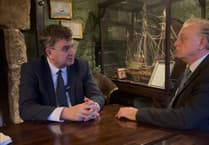Sarah Pitt talks to Marie Howe of Callington, whose 11-year-old son Mason lives with Kleine-Levin Syndrome, more commonly known as Sleeping Beauty Syndrome.
LOSING days to sleep is just part of life for Mason Howe. The 11-year-old from Callington has something called Kleine-Levin Syndrome, more commonly known as Sleeping Beauty Syndrome. When he’s experiencing an episode – which can go on for up to three weeks – he will sleep all day and all night.
Even when he’s not sleeping, he will be yawning constantly, with no amount of sleep curing his fatigue. And, says mum Marie, when he is awake he will not be able to stop eating.
‘It is like he is hibernating,’ she says. ‘We are in the middle of an episode at the moment. It has already been going on for a week and a half and it is not letting up.
‘The last episode went on for nearly three weeks. It really robs him of his childhood.’
At the time we are talking, in the run up to Christmas, she is just hoping her son will be alert enough to enjoy the day with her, husband Craig and their other four children.
‘You just never know,’ she says. ‘We have to take each day as it comes. The excitement will probably keep him awake, though. That’s what I’m hoping. He loves Lego, that’s all he wants for Christmas. He often daydreams with this illness, and with Lego he can do that. He goes off into his own little world, building things.’
Mason first experienced an episode of Sleeping Beauty Syndrome when he was six years old.
‘We were at Butlin’s and it was the smoke machine that set it off,’ says Marie. ‘It is often also triggered by a cough, cold or flu symptoms. He seems to pick up colds more easily, and they do trigger more episodes, particularly in the winter months.’
When Mason is in serious sleep mode, he has to stay home from school with Marie, who no longer works outside the home – she is a care worker – so is on hand for him. If at all possible, though, he will go to school, where his classmates and younger brother Brody keep an eye out for him.
‘He loves school,’ says Marie. ‘He goes to Delaware Primary Academy in Gunnislake and they are really really good. If he needs to have a nap in the day he goes off and has one, and they understand why.
‘His classmates are really good, they will come out and tell me if Mason has been sleeping because he doesn’t alway know himself that he’s been asleep.’
Mason’s condition is so rare – just one in one million people have Sleeping Beauty Syndrome – that it is commonly misunderstood. To casual observers, it can look like laziness or boredom.
‘Mason loves it when he gets a birthday card saying ‘one in a million’, says Marie. ‘He says, ‘yes I know’. He is very clued up and he wants people to know that he’s not being lazy, he has KLS.
‘I think he gets sick of people saying he needs more sleep, because he already gets enough sleep!’ says Marie. ‘People always say to him things like ‘“I wish I could sleep for three weeks”. He doesn’t want to, though!’
The condition is so rare that the only specialist in the country, Dr Paul Gringras, is based in London, attached to Guy’s Hospital. Mason and his family consult him via Skype. His latest recommendation is that Mason should try lithium, more typically used to treat bipolar disorder and treatment resistant depression, in an effort to alleviate his symptoms.
‘It is meant to ease the symptoms, but it’s quite a serious medication to take so they don’t choose it lightly,’ says Marie. She hopes that the drug will make keeping up with school a bit easier for him.
‘He’s in Year 6 now, so quite an important year,’ says Marie. ‘The workload is going to be a bit more and he’ll be going up to comprehensive next year.
‘It is difficult. Even though he’s been diagnosed for five years, we are still finding things out, and we worry how he is going to cope as he gets older.
‘How it is going to affect him with his learning and is he going to grow out of it? He wants to work, but is he just going to sleep through everything?’
She said that she wanted to raise awareness of the condition, so other families with a child with KLS might seek a diagnosis.
‘Someone might read about Mason and recognise the symptoms in their own child,’ she says.
‘It is so rare we even had to explain it to our family doctor after we were told what it was.’





Comments
This article has no comments yet. Be the first to leave a comment.